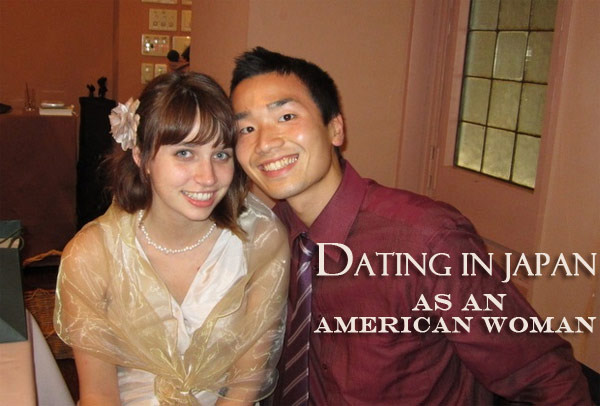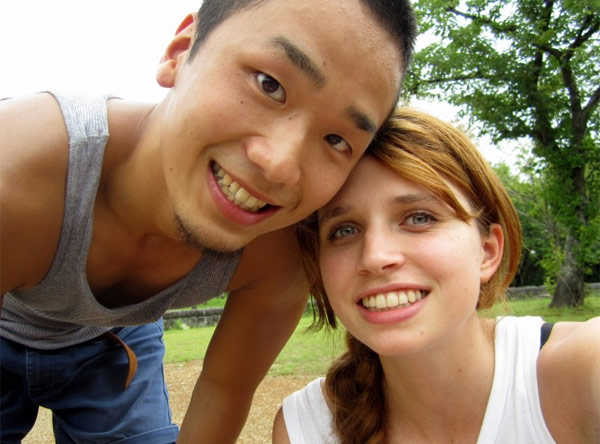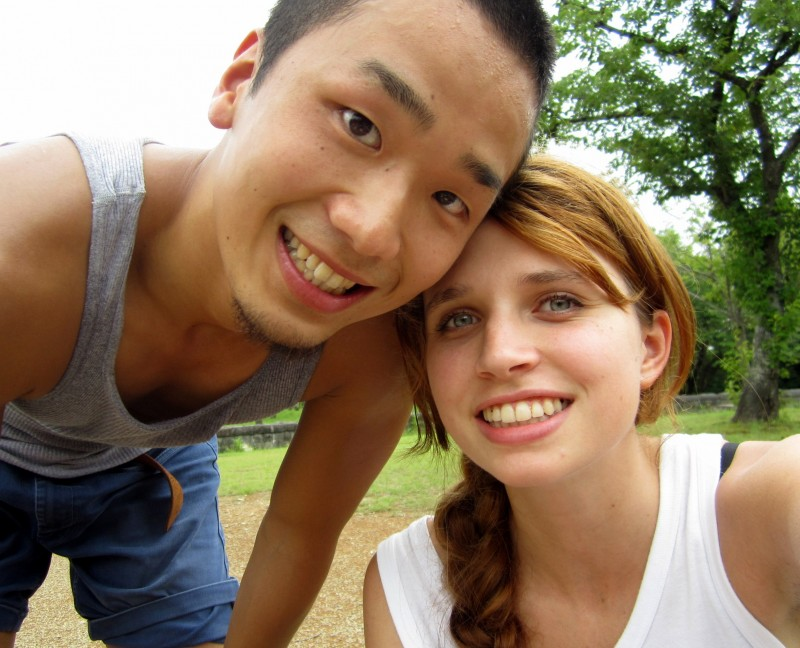Things I wish I had known before I moved to Tokyo
Anyone who has spent time in Japan can tell you that, of the interracial couples you find on the street, a disproportionately large number of them are non-Asian men dating Japanese women.
I don’t want to hate any of these men (or women), I’m just stating that the most common interracial relationships in Japan happen to be between a foreign man and a Japanese woman. In fact, the “reverse,” a Japanese man with a non-Asian partner, is rather rare. Nicknamed “AMWF” (which stands for Asian Male, White Female) or “AMBF” (Asian Male, Black Female), these couples are few and far between.
But “we” exist. And “we” even have our own support group.
This community is helpful not only because of the rarity of non-Asian women dating Asian men, but also because of complicated social issues such as dating the first son, gender roles, unequal earning potential. When each side enters the relationship with drastically different expectations, problems arise.

I met my husband in Pennsylvania. He was studying abroad at my university in America. I was on a committee with his roommate. Stuff happened. I spent the following year studying abroad in Tokyo, we got engaged, tied the knot shortly after I graduated from college, and moved back to Tokyo together.
As romantic as “moving across the world for love” sounds, in reality, the transition was tough. Japan is a wonderful, clean, and fascinating country, but as the foreign wife of a Japanese businessman, I’ve also found life rather isolating. It’s the little things, like when we went to the bank to get a replacement card and the teller asked my husband if he was acting as my translator, or when we moved into our first apartment, how the land-lady asked if we were roommates (and when she found out we were married, she seemed shocked), that can wear you down.
Maybe you’re moving to Japan for love. Maybe you got a job as an ALT or you’re studying abroad in Japan. Whatever your reasons, these are the four things I wish I would have known before I moved to Japan:
1. You will never be Japanese.
I can’t count the number of times I’ve read the blogs of people lamenting over the fact that they are always treated as a foreigner. Yes, it does kind of suck always being addressed in English or having strangers ask “What do Americans think about [insert food, social issue, etc],” but the sad truth is that you are not Japanese.
And no matter how much time you spend in Japan, you will never be Japanese. Once you embrace that fact, other people reacting to your “foreignness” gets less annoying.
2. Men and women often socialize separately and if/when you break that barrier, people might talk.
Nearly all of our couple-friends, and all of his coworkers, are Japanese. I often go days or weeks without running into another foreigner. This usually doesn’t bother me… except when it comes to double-dates.
In most (but not all) double-dates, the genders split up. Girls hang out with girls, guys hand out with guys. This becomes a problem when we do things like go to the beach with friends, because most of the time, the women want to stay in the sand (and often don’t even wear a swimsuit, but long cover-ups, and don’t want to get tan) while the men are out playing in the water. And of course, I’m in a bikini, ready to get tan, and dying to jump in the ocean with everyone else. So I play in the ocean with my husband.
And later, one of the girlfriends tells her boyfriend, who relays the information to my husband, that my behavior was inappropriate (yes, this happened, and yes, I’m still kind of bitter).
The little things that are “normal” for me (as an American) are not “normal” in Japan. It’s exhausting trying to navigate that barrier.
3. Despite what people might tell you, there are lots of ways to meet men in Japan.
A lot of my friends complain that it’s difficult to meet date-able (i.e. unmarried) men in Japan. Yes, it is difficult, but no, it is not impossible. If you’re interested on how to meet men in Japan, check out this post: How to Get a Japanese Boyfriend: Where to Meet Guys in Japan.
4. You can’t stereotype an entire race or gender of people.
You can’t say “All Japanese men are sexist” or “All Japanese women are docile.” That’s not fair. People are more than their gender (and race) and by automatically assuming that Japanese men are un-date-able or Japanese women are too “weak-minded,” you’re losing out on a great chance to make friends.
Remember how annoying it is when people ask “Do Americans like [insert food group, fashion choice, movie, etc]?” Don’t be that person. Whenever possible try to refrain from saying “Japanese people are _____.”

I’ve lived in Japan for going on three years now. I wouldn’t trade this opportunity for the world – living abroad in Japan is one of the most interesting and exciting things I’ve ever done.
Of course, we all have good days and bad days, but the important thing to remember is that you have a chance to experience a whole new way of life in the land of the rising sun.
Dating in Japan as an American woman” is a guest post and any information and opinion is provided by Grace. Therefore Zooming Japan doesn’t take any responsibility for the content.










Hi Grace,
You and your husband are quite an amazing couple. Thanks for sharing your story and opening up your experiences to others so that they might be prepared for the difficulties that an AMWF relationship encounters; that takes a lot of courage… and generosity. Your husband looks very fit and quite cool, so good catch there Grace. I am particularly impressed with your “drawing comics” credentials, as I’m a very frustrated and talent-less doodler that is in awe of anyone that can draw AND write. I truly wish you and your husband the best and I know the difficulties you (have already/) will encounter are certainly daunting, but with your attitude (and “support group”), you’re doing a great job to overcome the adversities!! Best of luck to you both!!
:D :thumbup:
I love this series of your blog, Jasmine. So interesting to know about the interracial relationships in Japan. Best wishes to Grace for a long and happy marriage!
Glad to hear you enjoy it. ^___^
Ah, Grace! The first one is an important one! I know a lot of people who beat themselves up for not being Japanese enough, and it frustrates me to see them get down on themselves for something that they can’t change.
Nice to see you guest posting here~ :kyah:
I agree and glad you liked her guest post. ^___^
Funnily enough, although you do see many more Japanese women dating non-Japanese men than vice versa, when it comes to marriage I know a hell of a lot more non-Japanese women married to Japanese men! My guess is that since we still live in a world where men tend to be the primary income earner, families who settle in Japan are more likely to have a Japanese husband, but even adding together all the mixed couples I knew in Australia the balance is still heavily tilted toward Japanese-husband over Japanese-wife (excuse the hetero-normativity).
That’s interesting. Do you live in a big city in Japan?
I noticed that all the married couples where she is non-Japanese, but he is Japanese live in big cities while in the Japanese countryside (where I live) you rarely see this combination.
Foreign husband and Japanese wife you can find everywhere in Japan, big cities and inaka likewise.
At least that’s my experience / observation. :)
No, I’m well in the inaka. Lots of foreign farming wives out here!
That’s quite unique then. :)
Are those women Asian, though?
Lots of Australians and New Zealanders… maybe because both are big farming nations being in the inaka isn’t such a big deal? I don’t know, really, but my “inaka” city in Japan has a population the same size as the entire state of Australia I am from, and I can drive to the next big city without having to take a plane like in Australia, so to me it really doesn’t feel inaka at all! But, I’m not a farming wife so I’m just guessing ^_^;
I’m not a fan of your writing style, you try a little hard to nit pick about things that it feels like don’t actually even effect or bother you. Stuff like you’ll never become Japanese? Come on. Would you ever expect to become French? Mexican? Jewish? I certainly hope not.
You bring out obvious points that I believe anyone with common sense in Japan understand. More Japanese girls with foreign men? Where? I’ve been living in Japan for eleven months in Tokyo and I never see this stereotype. I’m not saying this out of personal experience either. I’ve had 7 Japanese girlfriends and the one I’m currently with has been ongoing for over 4 months. Your writing style is elementary story telling and attention grabbing at best. I was hoping for a bit more as Ken Seeroi gave you a bit of the spot light. False expectations.
I’m not exactly sure who you are referring to, Grace (the author of this article) or me (the admin of this blog).
But anyway, I get what you’re saying, but as I’ve mentioned many times before this is a topic where EVERYONE has their own experience and there is not ONE truth to it.
I’ve only been in Japan for 7 years, but no matter where I went (I’ve been to all 47 prefectures) I always had the impression that the mixed couples with Japanese women and (Western) foreign guys are far more than vice versa. The only time I see a difference is when I visit Tokyo (where you obviously live). Tokyo can be quite different especially compared to the Japanese countryside where you rarely see any foreigners at all anyway.
A little FYI – there are many more foreign women married to Japsnese men. They’re mostly Asian women, and they tend to be conversant, if not fluent, in Japanese. Many of the students I teach in school have one other Asian parent, and the children have Japanese surnames.
I’m a Caucasian foreign woman with a Japanese partner. We find we get stared at more than the Japanese-other-Asisn couples, but find they’re fun to talk to because they share some of the same experiences.
All kinds of experiences here.
Grace, as you get older, you may find the othering, “you’ll never be Japanese” thing becomes less problematic. I’m in my 40s, and many of my foreign women friends are in their 50s and 60s, with Japanese partners and children. You become an obachan here, and people are generally welcoming and tolerant. You’ll change, too, as you grow in linguistic and cultural fluency, and you know yourself better. I wish you both a happy life.
Wow, the fact that Daisuke was a Japanese from Japan, and not a Japanese American Nissei who managed to get a white girl is quite amazing. AMWF relationships are rare, and when it does occur the Asian male is usually American born, not Fresh Off the Boat! As a sociology major I can tell you that statistically this combination of AMWF between a Japanese Issei is rarer than AMWM relationship where the Asian male is born in American. I am very glad to see you have blogs regarding your relationship to show the world that this rare combination does exist. I am happy to see AMWF relationships flourish in Japan. But the reality is, this combination is even seen as an anomaly in America also as you know.